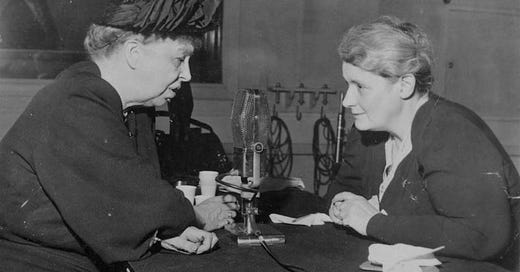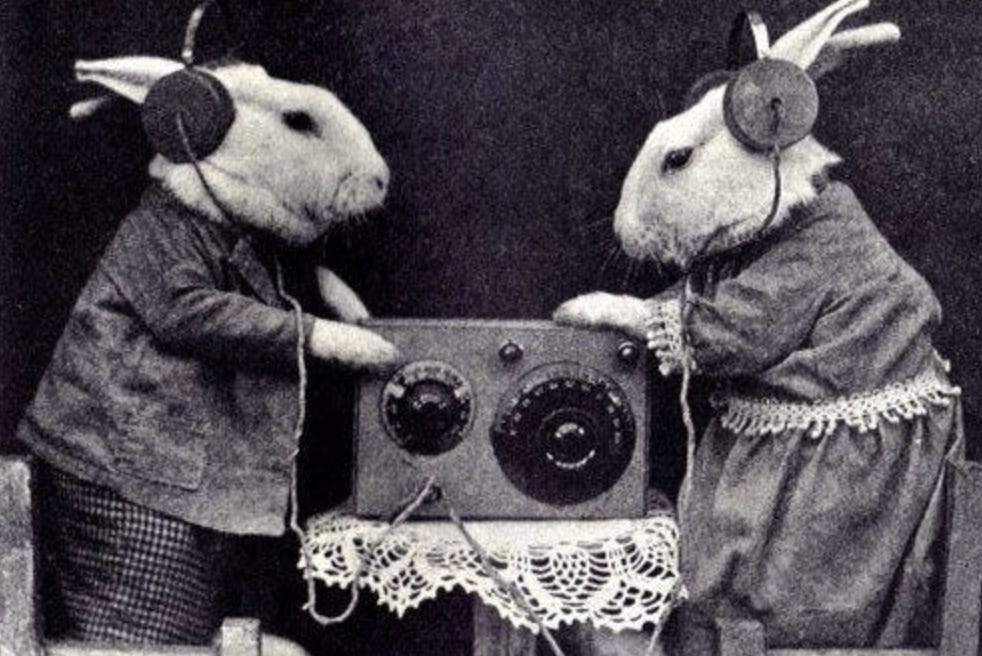A few announcements:
There are a few hours left to apply for the Transom Traveling Workshop in Interlochen, Michigan! Spend the last week of August among the quiet pines of northwest Michigan, learning all about the magic of audio storytelling. Applications are due tonight at 11:59 pm.
This summer, Transom is heading to Europe! In collaboration with the Berlin School of Podcasting, David Weinberg is leading a special press freedom focused workshop. The week long session also includes a master class lead by Serial host, Sarah Koenig. Applications are due June 8.
What’s new on Transom
Audio Ancestors: Mary Margaret McBride by Julia Barton
In the second installment of her “audio ancestors” series, Julia Barton highlights the life and career of the “First Lady of Radio”, Mary Margaret McBride. Credited with having invented the confessional interview format we are so familiar with in podcasting today, McBride was a giant of a media figure. And yet, many of the inheritors of her legacy — from Terry Gross to Anna Sale — have never heard of her.
This makes Mary Margaret McBride the precursor of every interviewer, from Joe Rogan to Oprah Winfrey, who’s tried to get guests to relax, to forget about the mic, and blurt out surprising insights and secrets before an audience of strangers.
But as McBride’s biographer Susan Ware points out, self-effacement wasn’t an act. Maybe it came from being raised conservative Baptist in rural Missouri, but modesty also served as her journalistic superpower. For someone who was called in her time the “First Lady of Radio,” she might have seemed a little flustered during interviews (though never unprepared) but it seemed to encourage her guests to open up and tell her more.
“Starting her interviews in what seems to be an offhand, almost naïve manner, she turns a guest painlessly ‘inside out,’ eliciting information he or she would not ordinarily reveal to any other reporter,” wrote long-time radio critic Ben Gross in 1954. “That is why schools of journalism in the metropolitan area have made her broadcasts required listening.”
More to explore on Transom.org:
Listen to the latest episode of Sound School, in which Rob Rosenthal revisits a piece made by the late Larry Massett. Rosenthal lays out how Massett takes a mundane trip to the dentist and transforms into a transcendent sonic experience.
Tip of the week: interviewing people about hard things
Treat an Interview Like a Relationship by Anna Sale
Like the “First Lady of Radio”, Anna Sale knows how to have tough, intimate conversations on mic. An urgent curiosity spurred by a big life change thrust Sale into the business of asking people very personal questions. But even though she makes it sound easy, underneath is a huge amount of intention, care, and compassion — and it goes beyond the minutes spent interviewing. In her manifesto from 2021, Sale outlines nine tactics that she has found are crucial to doing this well.
From my own experience, I’ve learned that the foundation of an ethical, descriptive, and successful conversation is the relationship you create with the person you’re interviewing. The way you approach a hard conversation either reinforces a pathway for exchange or erodes trust in the relationship. You can set yourself up for a more productive, less volatile exchange by being clear about what you are trying to accomplish by treading into challenging terrain.
When you start a hard conversation, you want to be able to explain why. First, you need to ask yourself why you want to have a conversation about something hard. Then, when you initiate, start by asking if it is a good time to talk, and talk about why you want to have this particular conversation. I’ve been wondering about something, or I need to tell you something I haven’t. With this groundwork, you are signaling that you want to go into a different mode together. Again and again, I have noticed during interviews that when I explain why I am asking a particularly sensitive question, people are much more open to answering it. They feel invited in, rather than ambushed, and they invest in the idea of sharing something that could be useful to someone else.
From the archives
Exquisitely Challenging: Reporting on Suicide by Rob Rosenthal
Rumble Strip host Erica Heilman’s extraordinary piece, Finn and the Bell, documents the life of a teenager named Finn Rooney, who died by suicide in 2020. Heilman unravels the impact Finn had on his family and his community, and she does so with a great amount of care and intention.
In this episode of Sound School from 2021, Rob Rosenthal talks to Heilman about the challenges of reporting this story, and why being an independent creator allows her the space to make singular pieces like this one.
Community corner
This week’s question for you all: What are strategies that you’ve found useful when approaching a tough interview?






